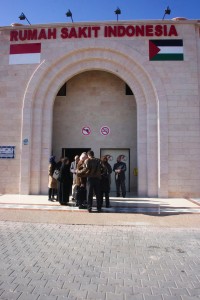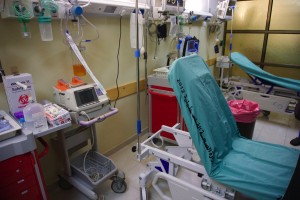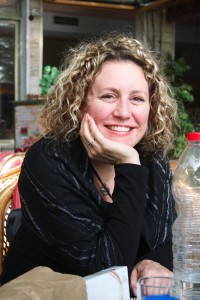‘Hope and aspiration’ in Gaza, by Gerri Haynes and Maria Filippone
Today, some members of our group were treated to a tour of the newly opened Indonesian Hospital – a beautiful facility funded by donations from Indonesia’s poor. Indonesian volunteers worked for more than four years (without salaries) along side workers from Gaza to complete this 100-bed hospital, now open for about one month.
During construction, portions of building were bombed, but that damage was repaired and patients, families and staff are enjoying this gift from the people of Indonesia!
Surgeries, consultations and teaching activities in other parts of Gaza began today also.
Maria Filippone, D.O. from Iowa wrote this report:
I spent today in Basmat Amal, a resource center for cancer patients and their families in Gaza City.
I spoke with about 20 women, all survivors of breast cancer. Initially I answered their medical questions. It didn’t take long to get to the real issue. The siege. The occupation. No economy. No opportunity.Most people live on subsidies from UNRWA, which often isn’t enough to cover basic living expenses, because there is no work. There is no work because of the blockade imposed by Israel.
The blockade is so harsh that some items not allowed in at one time or another include, but are not limited to, crayons, blankets, nutmeg, dry food items, stationery, and coriander. There is no economy, no work, buildings that haven’t
been reconstructed since Israel’s latest assault, few hours of electricity per day, a sea of unknown depth full of unmet needs, and an infectious, persistent resilience and warmth in spite of everything.One woman’s question in particular shook me. She asked: “In the US you have rights for humans, even animals have rights in the US. Why can’t we have those rights? We are human.”
They need to get permits from Israel to leave Gaza for chemotherapy and radiation. These permits are often not given, or if they are, they expire before the receiving hospital in the West Bank or Jerusalem can get the medicine.
Tamoxifen is allowed into Gaza but Herceptin is not. And if the medicine is available in Gaza, it is often too expensive. Can anyone in the US imagine a reality such as this one?
At one point the look on my face betrayed my feelings of sadness, and the women immediately started comforting me, hugging me, apologizing to me for making me sad, crying with me.
(Washington Physicians for Social Responsibility has traveled to Gaza since 1993. Since 2009, following the Cast Lead invasion by Israel, WPSR has sponsored ten medical delegations to serve the people of Gaza.)
RSS feed for comments on this post. TrackBack URI


